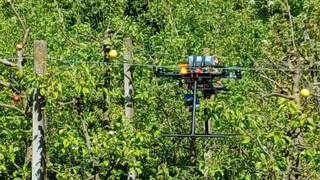Editor’s Message
It is with great excitement that we present the inaugural issue of Innovation Digest.
This research newsletter is dedicated to informing our academic peers, industry partners, and stakeholders about the groundbreaking work of our academics. Each issue will feature a contemporary research topic. We hope the newsletter serves as a source of inspiration and a catalyst for collaboration, sparking new ideas and partnerships that will drive innovation that will impact society.
In this first issue, we explore the transformative world of Artificial Intelligence (AI), a field that is reshaping industries, economies, and societies at an unprecedented pace. AI is not just a technological advancement; it is a catalyst for change, fuelling innovation across diverse sectors. From deep space exploration and transportation to healthcare, AI is revolutionising how we live, work, and interact with the world around us. The technology has been in the spotlight this year, with the Nobel Committee honouring the transformative power of AI with two Nobel Prizes.
Eight cutting-edge research studies are highlighted in this issue, each propelling AI’s transformative impact to new heights, driving innovation, and reshaping the future. These studies showcase the breadth and depth of AI research at our university, reflecting our dedication to addressing real-world challenges through technological advancement.
Two of the highlights include innovative work on AI infrastructure where our researchers are developing robust frameworks on Edge AI and in-sensor computing architectures that enable real-time data processing and decision-making at source, thereby reducing latency and bandwidth usage while enhancing privacy and security. The research has empowered AI to be more responsive, thus enhancing its capacity in the development of smart cities.
In the realm of AI development, our researchers are pushing the boundaries of Edge Generative AI, creating algorithms that are more intuitive and capable of learning from minimal data through smaller-scale models. These advancements make the models more favoured for deployment on resource-constrained devices in remote or mobile environments.
The applications of AI are innumerable and varied, and our researchers are at the forefront of exploring these possibilities. From remote sensing of asteroids, synthesis of novel materials, robotic automation, image restoration, to improving medical diagnostics, the research featured in this issue demonstrates the transformative potential of AI in solving complex problems and improving quality of life.
In addition, Innovation Digest is proud to feature a Student Corner, celebrating the achievements and activities of our research students. We are thrilled to announce recent awards and initiatives that highlight their exceptional work and dedication.
I hope you enjoy reading Innovation Digest!
 | Prof. Cheng DONG Associate Vice President (Mainland Research Advancement) Chair Professor of Cell Engineering and ImmunoMedicine, Department of Biomedical Engineering The Hong Kong Polytechnic University |




